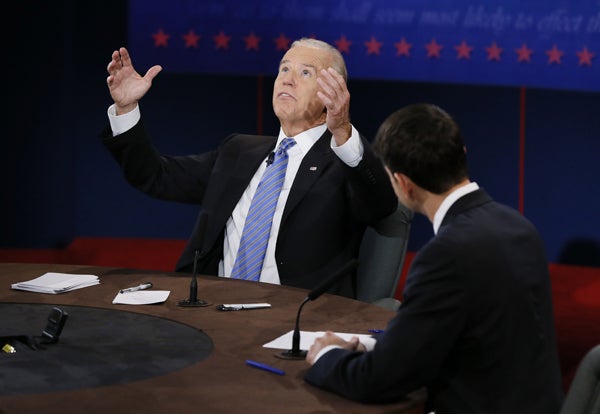VP Debate: Joe Biden’s Three Most Misleading Foreign Policy Statements
Lachlan Markay /
During Thursday night’s vice presidential debate, Vice President Joe Biden made numerous misleading or outright inaccurate claims regarding American foreign policy and the Obama administration’s performance on that front.
Attacks against Americans and American diplomatic facilities in North Africa – most notably Libya, where U.S. ambassador Chris Stevens and three others were killed – have thrust foreign policy to the forefront of the presidential contest. Biden’s claims on that front, then, merit particular attention.
Here are Biden’s three most factually-challenged foreign policy claims from Thursday’s debate.
Biden falsely claims he did not vote to invade Afghanistan or Iraq
In what was at best a serious misstatement and at worst a flat out lie, Biden claimed that he voted against the wars in Iraq and Afghanistan as a Senator. In fact, he voted for both.
“I was there, I voted against them,” Biden said of the wars. “I said, ‘no, we can’t afford that.'” In reality, Biden voted for the congressional resolutions authorizing the use of force in Afghanistan – on September 14, 2001 – and Iraq – on October 11, 2002.
Biden contradicts State, blames intelligence community for Libya misinformation
Biden flatly contradicted his own State Department in claiming that initial intelligence after the attack on the U.S. consulate in Benghazi indicated that the violence was a response to an obscure YouTube video.
State Department officials say that they never concluded the attack was a spontaneous protest against the video. They made that clear in a late-night conference call with reporters on Tuesday, and reiterated the point the following day at a House Oversight and Government Reform Committee hearing.
But Biden attributed the White House’s false statements (it has since retracted its initial characterizations of the attacks) to unnamed intelligence sources. “The intelligence community told us that,” he told debate moderator Martha Raddatz.
So who’s right, Biden or State? According to a report from the Daily Beast’s Eli Lake, who cited three sources in the intelligence community, “U.S. intelligence agencies had strong indications al Qaeda–affiliated operatives were behind the attack, and had even pinpointed the location of one of those attackers” within 24 hours of the Benghazi attacks.
Biden claims the administration didn’t know the Benghazi consulate requested greater security, again contradicting State
“Anyone who paid attention to a hearing in Congress this week knew that the administration had been implored to beef up security at the U.S. Consulate in Libya before the deadly terrorist attack there,” wrote the Associated Press on Friday. “But in the vice presidential debate Thursday night, Joe Biden seemed unaware.”
Indeed, the day before the debate, Eric Nordstrom, the former chief security officer in Libya, told Oversight that his entire team was “in sync that we wanted these resources.”
What’s more, State has admitted that they received – and denied – requests for additional security. “Senior State Department officials acknowledged to Congress on Wednesday that they had turned down requests to send more U.S. military personnel to guard diplomatic facilities in Libya shortly before the Sept. 11 attack,” the Los Angeles Times reported.
On Friday, a White House national security official was forced to state that Biden does not speak for the administration on this issue.

